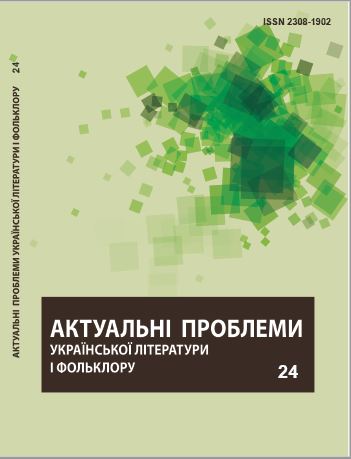Поетика роману Гео Шкурупія «Жанна-батальйонерка».
DOI:
https://doi.org/10.31558/2308-1902.2016.24.8Ключові слова:
роман, стиль, образи, фаустівська людина, романтика вітаїзмуАнотація
Проаналізовано поетику роману Гео Шкурупія «Жанна-батальйонерка». З’ясовано, що письменник виходить на фаустівський приклад героїчної, інтелектуальної, логізованої етики, яка заперечує долю і стверджує причинність, а також виражає волю до безкінечності, безмежну волю, що відповідає на виклик історичного моменту й вимагає переборення переднього плану життя. Тому герої твору не лише моделюють певні соціальні характери свого часу, але й визначають портрет епохи “горожанських воєн”. У романі переважає ігровий принцип, а також особливу роль відіграють парадокс та іронія.Посилання
Бернадська Н. І. Український роман: теоретичні проблеми і жанрова еволюція: Монографія / Ніна Бернадська. – К.: “Академвидав”, 2004.– 368 с.
Коломієць Л. Етичний феномен “громадської людини” Миколи Хвильового: образ Фауста як символ українського відродження // Молода нація: Альманах. – К., 1996. – С. 31 – 40.
Шкурупій Гео. Жанна-батальйонерка // Життя й революція. – 1929.– №4. – С. 5 – 47; №5. – С. 35 – 76; № 7 – 8. – С. 60 – 82; № 10. – С. 43 – 62.
Шпенглер О. Закат Европы / Авт. вступит. статьи А. П. Дубнов, авт. комментариев Ю. П. Бубенков и А. П. Дубнов / Освальд Шпенглер. – Новосибирск: ВО “Наука”. Сибирская издательская фирма, 1993.– 592 с.
Stoff A. Fabula. Jako zapis eksperymentu myslowego // Studia z teorii literatury і poetyki historycznej. – Lublin, 1997. – S. 120 – 136.

